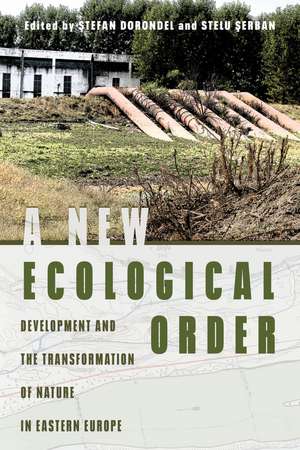A New Ecological Order: Development and the Transformation of Nature in Eastern Europe: INTERSECTIONS: Histories of Environment
Editat de Stefan Dorondel, Stelu Serbanen Limba Engleză Hardback – 3 mai 2022
Contributors consider territories engulfed by empires, from the Habsburg to the Ottoman to tsarist Russia; territories belonging to disintegrating empires; and countries in the Balkan Peninsula, Central and Eastern Europe, and Eurasia. Together, they follow a rhetoric of “correcting nature,” a desire to exploit the natural environment and put its resources to work for the sake of developing the economies and infrastructures of modern states. They reveal an eagerness among newly established nation-states, after centuries of imperial economic and political impositions, to import scientific knowledge and new technologies from Western Europe that would aid in their economic development, and how those imports and ideas about nature ultimately shaped local projects and policies.
Din seria INTERSECTIONS: Histories of Environment
-
 Preț: 436.80 lei
Preț: 436.80 lei -
 Preț: 200.41 lei
Preț: 200.41 lei -
 Preț: 400.33 lei
Preț: 400.33 lei -
 Preț: 430.27 lei
Preț: 430.27 lei -
 Preț: 359.45 lei
Preț: 359.45 lei -
 Preț: 492.26 lei
Preț: 492.26 lei -
 Preț: 459.98 lei
Preț: 459.98 lei -
 Preț: 500.91 lei
Preț: 500.91 lei -
 Preț: 333.77 lei
Preț: 333.77 lei - 15%
 Preț: 457.24 lei
Preț: 457.24 lei -
 Preț: 461.72 lei
Preț: 461.72 lei -
 Preț: 320.52 lei
Preț: 320.52 lei -
 Preț: 350.79 lei
Preț: 350.79 lei -
 Preț: 387.44 lei
Preț: 387.44 lei
Preț: 427.77 lei
Nou
81.86€ • 88.89$ • 68.77£
Carte disponibilă
Livrare economică 01-15 aprilie
Specificații
ISBN-10: 082294717X
Pagini: 300
Ilustrații: 10 b&w illustrations
Dimensiuni: 152 x 229 x 33 mm
Greutate: 0.57 kg
Editura: University of Pittsburgh Press
Colecția University of Pittsburgh Press
Seria INTERSECTIONS: Histories of Environment
Recenzii
“Surely destined to become a classic, this innovative book focuses on how the complex region that is Eastern Europe employed natural resources to bring about economic benefit and growth. Explaining the intertwined and ever-changing socio-political national regimes and their histories, these well researched case studies offer tantalizing comparisons with other parts of the world.” —Jane Carruthers, University of South Africa
"Overall, A New Ecological Order provides credible historical analyses of state intervention in the management of local natural sources aimed at promoting regional modernity in Eastern Europe."
—CEU Review of Books
"This superbly edited volume deserves readership far beyond the nascent subfield of Eastern European environmental history."
—Environmental History
"The anthology advances eastern European environmental scholarship significantly due to the richness of the empirical material, the broad scope of cases and regions, and its theoretical ambition. The writing is clear and concise; students and scholars will find it a wonderful resource in environmental historiography."
—Slavic Review
"A New Ecological Order is an important contribution to the history of technology, science, and environment of Eastern Europe, and it is well worth the read."
—Centaurus
Notă biografică
Ştefan Dorondel is a senior researcher at the Francisc I. Rainer Institute of Anthropology of the Romanian Academy and affiliated with the Institute for South East European Studies, Bucharest. He is the author of Disrupted Landscapes: State, Peasants, and the Politics of Land in Postsocialist Romania and coauthor of When Things Become Property: Land Reform, Authority and Value in Postsocialist Europe and Asia.
Stelu Şerban is a sociologist at the Institute for South East European Studies, Bucharest, with an interest in postsocialist transformations in South East Europe, everyday life in rural societies, ethnicity, and political ecology. He is the author of Elites: Parties and Political Spectrum in Interwar Romania.
Descriere
The rise of industrial capitalism in the nineteenth century forged a new ecological order in North American and Western European states, radically transforming the environment through science and technology in the name of human progress. Far less known are the dramatic environmental changes experienced by Eastern Europe, in many ways a terra incognita for environmental historians and anthropologists. A New Ecological Order explores, from a historical and ethnographic perspective, the role of state planners, bureaucrats, and experts—engineers, agricultural engineers, geographers, biologists, foresters, and architects—as agents of change in the natural world of Eastern Europe from 1870 to the early twenty-first century.
Contributors consider territories engulfed by empires, from the Habsburg to the Ottoman to tsarist Russia; territories belonging to disintegrating empires; and countries in the Balkan Peninsula, Central and Eastern Europe, and Eurasia. Together, they follow a rhetoric of “correcting nature,” a desire to exploit the natural environment and put its resources to work for the sake of developing the economies and infrastructures of modern states. They reveal an eagerness among newly established nation-states, after centuries of imperial economic and political impositions, to import scientific knowledge and new technologies from Western Europe that would aid in their economic development, and how those imports and ideas about nature ultimately shaped local projects and policies.
